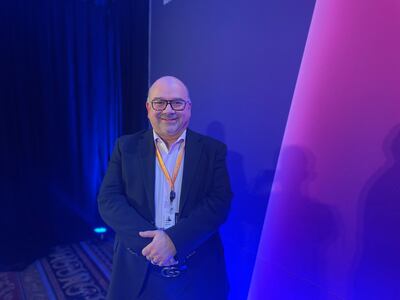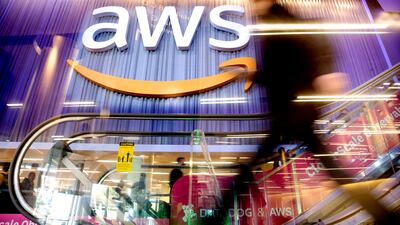The Internet of Things (IoT) industry is expected to grow significantly in the post-Covid era, driven by the fusion of generative artificial intelligence with IoT applications and technologies, according to the head of IoT at Amazon Web Services.
“IoT is still a young industry, but it is accelerating very fast. Earlier, it was just a choice, but the pandemic was an eye-opener and now it has become an absolute necessity for all businesses,” Yasser Alsaied, vice president and head of IoT at AWS, told The National.
“[The] pandemic was sudden … it imposed global lockdowns. Then who was monitoring or controlling the supply chains, factories, fires in forests, accidents, water pollution and the likelihood of another contagion? Unfortunately, nobody was around. Lessons learnt during the pandemic made remote sensing, remote controlling and remote management essential, and it is only possible through IoT.”

IoT is a collective network of connected devices that enables communication between computing systems through wired or wireless networks. This connectivity allows seamless digital monitoring or potential control of the physical environment.
“At AWS, we are building the fabric of IoT together, that includes cameras, sensors, chips, cloud services and risk mitigation.
“We have also merged it with generative AI that has added an extra layer of confidence and new use cases … IoT is the harvester of data and AI is helping to keep it secure, valid and make succinct predictions,” said Mr Alsaied.
This week, AWS unveiled its generative AI platform Amazon Q as a rival to Google-owned Bard and Microsoft-backed OpenAI in the fast-growing industry.
The new tool aims to enable businesses to streamline tasks and accelerate decision making and problem solving.
The potential value of IoT is growing. By 2030, consultancy McKinsey estimates the industry could be worth $12.5 trillion globally. This includes the value captured by consumers of IoT products and services.
The IoT market is projected to hit $2.06 trillion in 2028, from $1.02 trillion this year, growing at a compound annual growth rate of more than 15 per cent, according to research firm Mordor Intelligence.
AWS is focusing on three segments as part of its IoT initiative, which it says are fuelling the industry's growth: smart homes, automotive and industrial.
However, the IoT industry is complex and challenging, with businesses often tending to ignore its value, Mr Alsaied said.
“Any new technology or any new method of looking at things will have an impedance, especially in traditional environments like factories and buildings,” said Mr Alsaied, who joined the Seattle-based cloud services provider in 2021, after a 14-year stint at chip maker Qualcomm.
“Many enterprises do not link IoT with their profits and they tend to ignore it. But this perception is changing fast, especially when we have actual examples and case studies to prove the value and monetary gains.”

In a recent use case, a Coca-Cola factory in Turkey, one of the company’s biggest in the world, managed to save nearly 20 per cent on its bottom line by reducing waste in 12 months after using IoT solutions, Mr Alsaied said.
Another customer in Taiwan managed to save $30,000 in power bills in the first six months after implementing IoT solutions.
“That's a real money. So, besides reducing pollution, avoiding road accidents and predicting equipment maintenance, the cases that reflect actual savings have started to emerge. And they are helping us to win customers’ confidence,” Mr Alsaied said.
Founded in 2006, AWS is the world's biggest cloud services provider. It had good momentum in sales in the September quarter. Revenue reached $23.1 billion in the third quarter – rising annually by more than 12.2 per cent.
It has more than 240 services for various units such as compute, storage, databases, networking, analytics, machine learning, AI, IoT, security and augmented reality.
An average number of daily unique IoT devices connecting to the AWS service is 270 million.
“So, we have a unique 270 million devices working in parallel on any day … sending signals, messages, storing information at a massive scale from various sources such as cars, buildings, machines, factories and homes. To ensure data safety, we have implemented a multi-layer of encryption and security,” Mr Alsaied said.
“We also ensure we are delivering what our end customer wants, while following the data privacy regulations of different regions and governments.”


